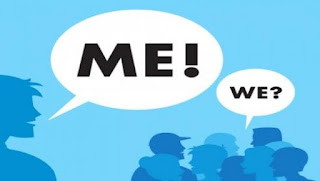THE ART OF ADULTHOOD IS TO
DEVELOP SELF-CONFIDENCE WITHOUT ARROGANCE
-
Andrew Fuller
Development is a lifelong process which does
not stop at any particular stage. The development of an individual does not stop
with attaining adulthood. However, adolescence is regarded as the most
vulnerable stage when an individual’s undergo most changes. Adolescence is
generally defined as the second decade of a child’s development. It is the
period of transition from childhood to adulthood which occurs between the age
group of 13 to 19.
Challenges occur mainly in the late adolescent
period. Considered as emerging adulthood, late adolescence is significant for
building the base for developmental changes to occur throughout the life span. Challenges
are seen to be in the form of behavioral challenges, cognitive challenges and behavioral
challenges. However this article will focus on emotional and behavioral
challenges due to its rising seriousness. Before moving on to the challenges,
attempt should be made to comprehend the scenario which arouses such
situations.
ROLE OF MODERN SOCIETY IN POSITING CHALLENGES
The concept of modernity today has become a
controversial one embodying both positive and negative implications. Modern
society today became highly specialized in economic and social realms that it
is recognized as being fragmented by experts. This leads to the lack of interaction
between the people or communities together. Modern society, which is the abode
of an individual, is obvious to play a crucial role in the development of the
child by influencing him or her in varied ways. Some among such significant
challenges are discussed below.
1) The Rise in
the concept of Individualism:
Today, man is the center of the universe. The focus lies on the individual.
Therefore, people turned self-centered focusing on individual needs and
desires. Individual autonomy , individual rights and individual desires , hopes
and dreams gains prime importance leading to a decline in collective or brotherhood
feeling. This, in a way affects the teenager who by imitating people
surrounding him turns self-centered.

2) Development in Science and Technology: Scientific
development today reached its peak. People are luxuriating the wonders of
sciences which simplify complicated tasks.
However, due to the development in the electronic gadgets and with the
coming of computers, smart phones and video games, the teenager gets immersed
in it. This leads to the lack to communication among the family members or
their closed ones. This in turn affects the behavior of the child turning him
to a more introvert kind of an individual due to the lack of interaction.
3) Excessive
exposure to media: Media today plays a significant role in
shaping teenage behaviors. A teenager’s body image is being influenced by the
media. A teenager’s fashion sense is being shaped by media. Apart from this,
the violent content in media which mirrors the violence in the modern society
affects
4) Increase in
competitiveness: Modern society is
characterized by a high degree of competitiveness. With the increase in job
opportunities, demands for better intakes too increased. Teenagers are under
tremendous pressure to cater to those demands right from their schooling. This
might lead the teenager to get frustrated and miss out the real happiness of
life. This in turn might result in many behavioral and emotional changes in the
teenager.
5) Rise in Materialism: Today’s modern society promotes
materialism. Success and happiness are
measured with material goods by the teenagers. A decline in material belongings
leads the teenagers to undergo inferiority complex when compared with their
peers. The behavior of the teenagers is also thus shaped in that manner.
6) Single parent household: In today’s modern society, joint families
are being replaced by the nuclear ones. Pathetic are those where a child grows
up with a single parent and miss out on important family values of
togetherness. This too adversely affects a child’s growth.
EMOTIONAL AND BEHAVIORAL CHALLENGES
From the above discussion it is clear that
contemporary society plays a significant role in positing challenges for the
teenagers. Adolescent age is marked by
immense turmoil in behavioral and emotional spheres. Teenagers more often are
seen to battle with emotional and behavioral challenges. Some of the major
emotional challenges are:
1) Emotional Imbalance:
Teenagers exhibit strong and intense emotions at times. Mood seems
unpredictable and the emotional imbalance leads to conflict within them. They
turn very sensitive to emotions.
2) Self-consciousness: Teenagers are more self-conscious about
their physical appearance and other changes. Their self-esteem is seen to be
shaped by this self-consciousness.
3) Depression
and anxiety: The teenagers
easily fall prey to depression and anxiety. The modern society too plays a
crucial role in his aspect. Unable to recognize their self, the teenagers
undergo the dreary experience of depression.
4) Instability
of the mind: During this stage,
the teenagers fail to achieve a stable state of mind. They are unable to make
independent permanent decisions. Instead their decisions and opinions keep
changing with the change in trend and thus they fail to build a strong and
static personality.
5) Negative
feelings rule: It is during
this stage that the teenagers are captured by a feeling of hopelessness. A
small rejection they face leads to complete hopelessness and losing of
confidence. Feeling of worthlessness, self-balance, guilt and self-criticism rules
their mind. Suicidal tendencies and the thought of death to disturb them.
Insecurities, irritations and frustrations grab them.
6) Conflict with
the closed ones: At this stage, we
witness the teenagers indulging in conflicts. Difference of opinion is experienced
which leads to arguments and conflicts. They feel the need t assert their
opinion over others frequently and fail to acknowledge the loopholes in their
opinions.
7) Losing the
track of small happiness: Teenagers
at their stage gets more inclined towards material pleasure and ultimately lose
pleasure in normal activities no matter how small they are. They fail to find
happiness in the natural sources.
These emotional challenges also lead to
behavioral changes in the teenagers. Rather than the emotional challenges,
these behavioral are the outward changes that are visible.
1) Change in
social relationships: Teenagers are more incline towards their friends
rather than their family at this stage. Thus they at times experience peer
pressure. They social circle changes and friends gain prime importance.
2) Mood swings: Teenagers often experience mood swings as a
result of which they might behave unexpectedly at times. They react immediately
to a situation which lands them into trouble.
3) Alcohol and
drug abuse: The teenagers during this stage are
more prone to alcohol and drug abuse which might also be a result of peer
pressure. This in turn hampers their thinking and reasoning capacities
4) Increase of
interest in the opposite sex:
Until the adolescent stage, children are more inclined towards people of their
same sex. But, during the teenage period, a change in behavior creeps in. The teenagers
seem to be more interested in the opposite sex which results in premature
relationships.
5) Unexpected behavior: Teenagers exhibit unexpected behavior due to
emotional imbalance and lack of control over the emotions.
6) Change in
eating behaviors: Eating
disorders and excessive exercising is experienced in this stage.
7) Changes in
energy levels: More tiredness
and overeating characterize this stage.
Now, an adolescent burdened with these
challenges might lose the track of the right doings. They might also be unable
to handle these pressures ultimately falling into depression. In such a
situation, an elderly person needs to intervene and carefully handle the sensitive
situation
Some of the significant measures that can be undertaken to help a teenager battles
with the challenges are as follows:
1) Interaction
with the child: Only with
interactions, problems can be fixed. The family members as well as the child should
interact with the child lending them a scope to share their problems.
2) Counselling programs: Counseling programs help a lot when the parents
of the victim are unable to spend time with their child due to hectic schedule.
In counseling programs, the teenager enjoys the freedom of sharing varied kind
of issues ranging from physical to psychological
3) Focus on the
development of good
habits: Introducing the teenager
with positive habits like book reading, creative arts, creative writing and
sports enables their mental growth. Teenage being the most productive stage
should be provided with the right kind of impetus required.
4) Sex
education should be provided:
Teenagers should be exposed to sex education so that inculcate a positive
attitude towards relationships which also prevents them from the danger of
getting into problems.
5) Positive
role models: Teenage is the
time when role models are formed. Leadership qualities should be fostered. They
are completely into “hero worshiping”. Therefore, positive role models should
be built so that they can affect the teenager in a healthy manner.
6) Activity
options should be provided to the teens:
The teens should be granted the chance to entertain themselves with other
activity options which will deviate their attention from the substances of
alcohol and drugs.
7) Friendly relation: Teenage is the period when the child cannot
be taught with the use of violence and power. Therefore, parents and teachers
should develop a friendly relation with the child so that they feel free to
approach them.
Adolescence should be viewed as a period of
opportunity instead of turmoil. The emotional and behavioral challenges can be reduced
to a large extent through positive measures. Many positive facets of this stage
cannot be covered under the confusion and chaos that it embodies. Adolescence though is a period of storm or stress
is also a period of innovation and development when taken proper care. Adolescence is a mental concept rather than a
concept of numbers. Thus, it has been rightly said that –
“As a child I assumed
that when I reached adulthood, I would have grown up thoughts”
- David Sedaris










